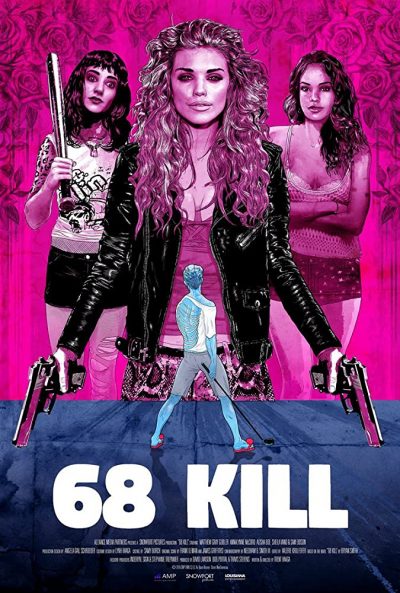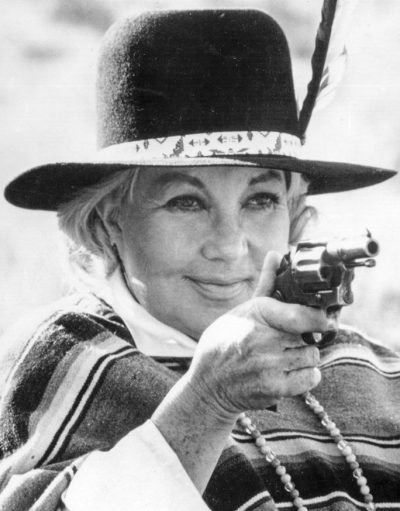★★★½
“Sex ‘n’ drugs ‘n’ cartels rule.”
 There are more famous narconovelas, such as La Reina Del Sur, but you can’t argue with the success of Senora Acero. Surviving for five seasons and a startling 387 episodes in the cut-throat world of Mexican television is no mean feat. Admittedly, there were hardly any characters who lasted the entirety of the show. But such is the nature of organized crime, especially in a show like this. Compared to the first season, it seems like the second helping significantly ramps up the action quotient. It feels like a single episode could not pass, without a car-chase, shoot-out, or at least guns being pointed at each other.
There are more famous narconovelas, such as La Reina Del Sur, but you can’t argue with the success of Senora Acero. Surviving for five seasons and a startling 387 episodes in the cut-throat world of Mexican television is no mean feat. Admittedly, there were hardly any characters who lasted the entirety of the show. But such is the nature of organized crime, especially in a show like this. Compared to the first season, it seems like the second helping significantly ramps up the action quotient. It feels like a single episode could not pass, without a car-chase, shoot-out, or at least guns being pointed at each other.
It begins with Sara Aguilar (Soto), a.k.a. “Senora Acero”, the woman of steel, sitting in prison, where she has been stuck for five years, awaiting formal sentencing [Mexican justice moves slowly, it would appear]. After her son is attacked, she escapes prison in order to help him, but gets caught and ends up back in jail, having been sentenced to a punitive 25 years. This is in part due to the interference of her estranged sister, Berta, who is now the private secretary to the Mexican President, and wields her influence maliciously to punish her sibling. But her best friend, Aracely (Litzy), finds the key to getting Sara’s sentence revoked, and her out of jail.
Life doesn’t exactly become much easier thereafter, as there’s still a state of near-war between the two main drug gangs. There’s the Jalisco cartel, led by Miguel Quintanilla, and Acasio “El Teca” Martínez, of the Tijuana cartel. Sara ends up taking the Jalisco side, stoked largely by her hatred of El Teca, and his chief henchman, “El Indio”, with whom Sara crossed paths in season one. However, that only fuels the fire as Martinez has long held a burning obsession with Sara. His guiding principal appears to be that if he can’t have Sara, nobody can. Sara has no problems using that obsession against him, but it’s a very dangerous game, especially when El Teca realizes he is being manipulated by her.
It also seems to delve significantly deeper into the relationship between the cartels and ‘legitimate’ business and political interests; quotes used advisedly. In this case, the corruption goes right up to the top, with the Mexican president very much in bed with the leader of one group of drug traffickers. Evidence of this connection is a powerful tool, though for obvious reasons, highly dangerous to anyone who possesses it. There is also the head of a major pharmaceutical company, who is using his company’s resources for less legal product; he thinks he can come up with a new drug that will give the high without the dangerous side effects.
The international aspect is well represented too, with another strong female character in Colombian drug lord (drug lady?) Briceida Montero, who seems fairly obviously inspired by Griselda Blanco, about whom we have written previously. There is an effort to involve Chinese traffickers at one point, though this doesn’t go far. On the other side, the DEA are involved. Though their gringo boss is most notable for Chris turning to me and expressing a fervent hope that, as I continue to learn Spanish, I do not sound like him when I speak the language. Mind you, she’s not exactly impressed with the gangster slang used by the likes of El Teca either. I’m clearly going to have to find posher series from which to pick up my diction…
The show does have one particularly memorable supporting character – though not in a good way. Marta Mónica Restrepo, a.k.a. ‘La Tuti’, is a sometime small scale drug dealer, sometime psychic, and always a slut, who also collects dolls. She ends up getting involved with… just about every male character who crosses her path, which makes her subsequent pregnancy resemble a daytime talk-show episode. Manipulative and fickle, she is easily our most “love to hate” character. Not just in the show, or narconovelas generally, but perhaps the history of our TV viewing. I suspect it’s entirely deliberate, so much credit to the writers, and actress Ana Lucía Domínguez, for making it so.
 There’s another aspect we found more genuinely enjoyable. El Teca finds himself a doppelganger, in the form of an immigrant worker from Colombia. Also kidnapping the man’s wife and daughter for leverage, his double is used to fool both the authorities in the Jalisco cartel. While the technical aspects for the depiction of El Teca and his twin are primitive – it’s mostly shooting from behind the shoulder, with an obvious stand-in – the characters are so utterly different, it’s often difficult to believe the same actor is playing both parts. Again, credit where it’s due, to José Luis Reséndez, for bringing both men to life with his performance.
There’s another aspect we found more genuinely enjoyable. El Teca finds himself a doppelganger, in the form of an immigrant worker from Colombia. Also kidnapping the man’s wife and daughter for leverage, his double is used to fool both the authorities in the Jalisco cartel. While the technical aspects for the depiction of El Teca and his twin are primitive – it’s mostly shooting from behind the shoulder, with an obvious stand-in – the characters are so utterly different, it’s often difficult to believe the same actor is playing both parts. Again, credit where it’s due, to José Luis Reséndez, for bringing both men to life with his performance.
It is, however, Sara Aguilar’s show, and she is the Sun around which all the other bodies revolve, in their elliptical subplots (some of which I could have done without, such as that about one character’s dreams of musical stardom). Much like Teresa Mendoza in Queen of the South, it’s Sara’s fierce loyalty to those on her side which is her most defining characteristic. She’ll got through hell for them, including her son, even after he has been turned into a junkie by her enemies. Needless to say, that’s an act which will not go unpunished. The ending proves quite satisfactory in this area, although also has the kind of cliffhanger, with Sara apparently badly wounded, that will only be resolved in series three.
Despite the tease at the end of the opening credits, with Sara wielding a large, automatic weapon, and quite a lot of heavily-armed arguments, she isn’t quite as personally involved as I might have hoped. Still, I guess delegation is a significant part of being a good leader, isn’t it? This was certainly enjoyed, and became a staple of morning entertainment for me, over several months. I think Chris was even getting into it more than she’d admit, as she drifted through and got ready for work. It may be a while before I have the stamina to start the next season, however. For there’s ninety-three episodes in that…
Creator: Roberto Stopello
Star: Blanca Soto, Litzy, José Luis Reséndez, Lincoln Palomeque
 Firstly, the cast names listed below are copied verbatim from the movie. I can only presume that “Megan Thee Stallion” was unavailable, but seeing those names pop up in the opening credits does make it difficult to take a film seriously. It’s like you’re watching little children playing dress-up, and a whole level of recursive nonsense, with the actors playing roles, apparently playing roles in the their “real” lives. In other news: kids, get off my damn lawn.
Firstly, the cast names listed below are copied verbatim from the movie. I can only presume that “Megan Thee Stallion” was unavailable, but seeing those names pop up in the opening credits does make it difficult to take a film seriously. It’s like you’re watching little children playing dress-up, and a whole level of recursive nonsense, with the actors playing roles, apparently playing roles in the their “real” lives. In other news: kids, get off my damn lawn.






 You’ll probably understand why that cover picture got me to pause my casual scrolling through Amazon Prime. Well played, movie producers. Well played… Likely inevitably, the film didn’t quite live up to the advertising, mostly due to a significant lack of plot. The film barely runs 65 minutes, before we get to a sloth-like end-credit crawl, and there’s probably not enough story-line to fill a music video for one of the gangster rap songs which pepper the soundtrack. Yet, in terms of atmosphere and setting, it
You’ll probably understand why that cover picture got me to pause my casual scrolling through Amazon Prime. Well played, movie producers. Well played… Likely inevitably, the film didn’t quite live up to the advertising, mostly due to a significant lack of plot. The film barely runs 65 minutes, before we get to a sloth-like end-credit crawl, and there’s probably not enough story-line to fill a music video for one of the gangster rap songs which pepper the soundtrack. Yet, in terms of atmosphere and setting, it  This was among the very last of the “pinky violence” films made by the
This was among the very last of the “pinky violence” films made by the  Is it possible for an action heroine film to still be chauvinist? While that criticism was frequently levelled at
Is it possible for an action heroine film to still be chauvinist? While that criticism was frequently levelled at  The blurb I read, which got my attention, compared this to Queen of the South, and the debt is rather too obvious, with the novel falling short of the TV series. Layla Navarro has grown up as part of the Culiacan cartel in Mexico, and when its leader, her uncle “El Patrón” is captured by authorities, she has to step into the breach. However, there are a number of factions within the cartel who are unimpressed at the thought of being led by a woman, and have their own plans. When she discovers that one of the leading members, Don Guillermo Muñoz, is trafficking in young girls, she vows not to let it stand. But before she can take action, the plane she’s on is forced to land in the Mexican jungle. Along with Clay, her loyal Canadian pot-dealer ally, Layla has to avoid those seeking to finish the job, and strike back at Guillermo.
The blurb I read, which got my attention, compared this to Queen of the South, and the debt is rather too obvious, with the novel falling short of the TV series. Layla Navarro has grown up as part of the Culiacan cartel in Mexico, and when its leader, her uncle “El Patrón” is captured by authorities, she has to step into the breach. However, there are a number of factions within the cartel who are unimpressed at the thought of being led by a woman, and have their own plans. When she discovers that one of the leading members, Don Guillermo Muñoz, is trafficking in young girls, she vows not to let it stand. But before she can take action, the plane she’s on is forced to land in the Mexican jungle. Along with Clay, her loyal Canadian pot-dealer ally, Layla has to avoid those seeking to finish the job, and strike back at Guillermo. For most films. I’ve usually got a fairly good idea of what is likely to be the final review grade, inside about 30 minutes. It may drift half a star up or down, but it’s relatively rare for there to be more variation than that. This would be one such case, which started off as underwhelming, went through a brief surge of “Oh, yeah – I get it!” in the middle, before returning to the mediocrity from whence it came. At various points, this could have been anywhere between ★½ and (although briefly) ★★★★. Well done, I guess?
For most films. I’ve usually got a fairly good idea of what is likely to be the final review grade, inside about 30 minutes. It may drift half a star up or down, but it’s relatively rare for there to be more variation than that. This would be one such case, which started off as underwhelming, went through a brief surge of “Oh, yeah – I get it!” in the middle, before returning to the mediocrity from whence it came. At various points, this could have been anywhere between ★½ and (although briefly) ★★★★. Well done, I guess? This upper-tier B-movie, produced by Julie Corman, is notable for a handful of reasons. It includes not one but two Oscar winners. Director Demme would go on to receive one for Silence of the Lambs, and star Leachman had already won for her performance in The Last Picture Show. There’s also a small role here for Sally Kirkland, who’d be nominated for an Academy Award down the road. And perhaps most trivia-worthy are the presences in uncredited roles, of Bill Paxton and Dennis Quaid – both making their screen debuts.
This upper-tier B-movie, produced by Julie Corman, is notable for a handful of reasons. It includes not one but two Oscar winners. Director Demme would go on to receive one for Silence of the Lambs, and star Leachman had already won for her performance in The Last Picture Show. There’s also a small role here for Sally Kirkland, who’d be nominated for an Academy Award down the road. And perhaps most trivia-worthy are the presences in uncredited roles, of Bill Paxton and Dennis Quaid – both making their screen debuts. Turns out that The Asylum are not the only company who makes mockbusters. As its alternate name makes clear, this Lifetime TVM is clearly a knock-off of the title mentioned above, down to the same, basic plot. Two teenage girls begin doing crime, largely for the excitement. A teacher becomes aware of their exploits and decides to blackmail them for his own benefit, by making them escalate their activities. This brings them increasingly under the scrutiny of both authorities and criminal elements, not to mention parental disapproval, eventually leading to a climax where all these aspects cross paths. As my
Turns out that The Asylum are not the only company who makes mockbusters. As its alternate name makes clear, this Lifetime TVM is clearly a knock-off of the title mentioned above, down to the same, basic plot. Two teenage girls begin doing crime, largely for the excitement. A teacher becomes aware of their exploits and decides to blackmail them for his own benefit, by making them escalate their activities. This brings them increasingly under the scrutiny of both authorities and criminal elements, not to mention parental disapproval, eventually leading to a climax where all these aspects cross paths. As my  We reviewed
We reviewed